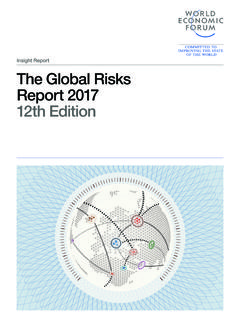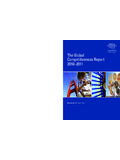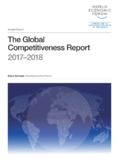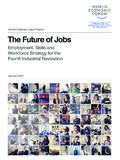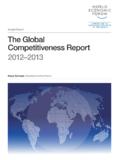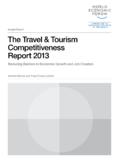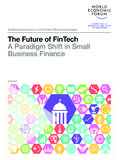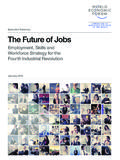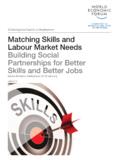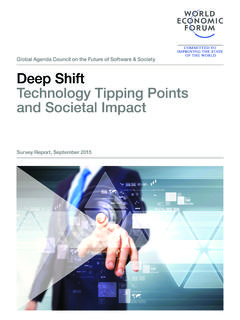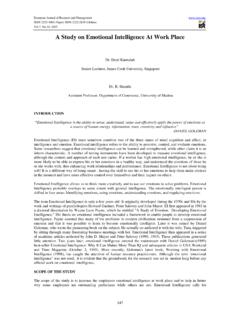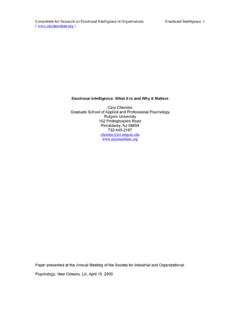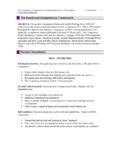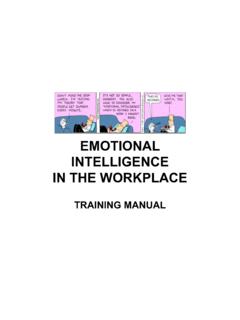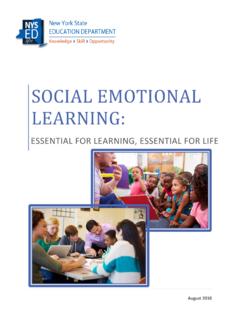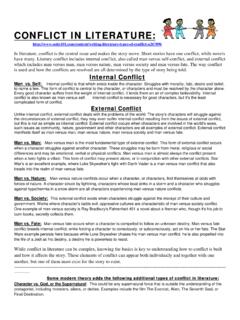Transcription of Platform for Shaping the Future of the New Economy and ...
1 Platform for Shaping the Future of the New Economy and Society Schools of the Future Defining New Models of Education for the Fourth Industrial Revolution January 2020. World Economic Forum 91-93 route de la Capite CH-1223 Cologny/Geneva Switzerland Tel.: +41 (0)22 869 1212. Fax: +41 (0)22 786 2744. Email: World Economic Forum . No part of this publication may be reproduced This report has been published by the World Economic Forum as or transmitted in any form or by any means, a contribution to a project, insight area or interaction. The findings, including photocopying and recording, or by interpretations and conclusions expressed herein are a result of a any information storage and retrieval system. collaborative process facilitated and endorsed by the World Economic Forum, but whose results do not necessarily represent the views of the World Economic Forum, nor the entirety of its Members, Partners or REF 09012020 other stakeholders.
2 2. Contents Key Findings_____ 4. Introduction_____ 5. Education : A Global Framework for Shifting Learning Content and Experiences Towards the Needs of the Future _____ 7. Shifting learning content_____ 7. Shifting learning experiences_____ 11. Schools of the Future_____ 14. Methodology_____ 14. The Green School_____ 15. Kakuma Project, Innovation Lab Schools_____ 16. The Knowledge Society_____ 16. Kabakoo Academies_____ 17. TEKY STEAM_____ 18. Accelerated Work Achievement and Readiness for Employment (AWARE)__ 18. iEARN_____ 19. South Tapiola High School_____ 19. Pratham's Hybrid Learning Programme_____ 20. Anji Play_____ 21. Prospect Charter Schools_____ 21. Tallahassee Community College, Digital Rail Project_____ 22. Innova Schools _____ 23. British School Muscat_____ 23. Skills Builder Partnership_____ 24.
3 Skilling for Sustainable Tourism_____ 24. Conclusion: An Action Agenda to Accelerate the Transition to Education 26. Notes_____ 27. References_____ 28. Acknowledgements_____ 30. Project Team_____ 33. 3. Key Findings In the context of job disruption, demand for new skills and Eight critical characteristics in learning content and experi- increased socioeconomic polarization, primary and second- ences have been identified to define high-quality learning in ary school systems have a critical role to play in preparing the Fourth Industrial Revolution Education : the global citizens and workforces of the Future . Education models must adapt to equip children with the skills to create 1. Global citizenship skills: Include content that focuses a more inclusive, cohesive and productive world. on building awareness about the wider world, sustain- ability and playing an active role in the global community.
4 This white paper is the outcome of a global consultative process initiated by the World Economic Forum's Platform 2. Innovation and creativity skills: Include content that for Shaping the Future of the New Economy and Society to fosters skills required for innovation, including complex identify promising models of quality education for the Fourth problem-solving, analytical thinking, creativity and sys- Industrial Revolution. It is the first output of the Forum's Edu- tems analysis. cation initiative, which aims to catalyse systems change by mobilizing a broad and innovative coalition of relevant 3. Technology skills: Include content that is based on stakeholders around new models, new standards and a new developing digital skills, including programming, digital momentum for action to transform the Future of education.
5 Responsibility and the use of technology. 4. Interpersonal skills: Include content that focuses on interpersonal emotional intelligence , including empathy, cooperation, negotiation, leadership and social awareness. 5. Personalized and self-paced learning: Move from a system where learning is standardized, to one based on the diverse individual needs of each learner, and flexible enough to enable each learner to progress at their own pace. 6. Accessible and inclusive learning: Move from a sys- tem where learning is confined to those with access to school buildings to one in which everyone has access to learning and is therefore inclusive. 7. Problem-based and collaborative learning: Move from process-based to project- and problem-based content delivery, requiring peer collaboration and more closely mirroring the Future of work.
6 8. Lifelong and student-driven learning: Move from a system where learning and skilling decrease over one's lifespan to one where everyone continuously improves on existing skills and acquires new ones based on their individual needs. Through a global crowdsourcing campaign, the World Eco- nomic Forum identified 16 examples of schools, education programmes and school systems that are paving the way toward Education , as defined above, based on the uniqueness of their approach, demonstrated impact and geographical diversity. These examples are meant to serve as inspiration for the shift towards a more holistic transforma- tion of education systems globally. 4. Introduction As globalization and rapid advancements in technology value These new drivers of growth created massive continue to transform civic space and the world of work, shifts in the skills required to contribute to the Economy and education systems have grown increasingly disconnected the ways in which people work, raising questions about the from the realities and needs of global economies and adequacy of current education systems in keeping pace with societies.
7 In the context of job disruption and increased these changes. polarization, primary and secondary school systems have a critical role to play in preparing the global citizens and work- Many of today's school children will work in new job types that forces of the Future . Education models must adapt to equip do not yet exist, most of which are likely to have an increased children with the skills to create a more inclusive, cohesive premium on both digital and social- emotional They and productive world. will be introduced to wholly new business models whose workforces are much more distributed. In an increasingly The need for new education models in interconnected world, Future workers will be expected to the Fourth Industrial Revolution collaborate with peers residing in various parts of the globe, The standardized model of direct learning widely used in understand cultural nuances and, in many cases, use digital mainstream education today was largely influenced by the tools to enable these new types of needs of the First and Second Industrial Revolutions, when the mass production of uniform talent was used to fill repet- Yet many education systems in developed and developing itive.
8 Process-oriented early manufacturing Although economies alike still rely heavily on passive forms of learning most education systems have continued to operate busi- focused on direct instruction and memorization, rather than ness-as-usual, innovation has driven economies toward new interactive methods that promote the critical and individual models of productivity. The Third and Fourth Industrial Rev- thinking needed in today's innovation-driven Economy (see olutions introduced production automation and intangible Figure 1).5 In many parts of the world, learning is confined Figure 1: In your country, how do you characterize the style of teaching? Passive (0) Interactive (100). Source Executive Opinion Survey, World Economic Forum, 2019. 5. to only those with direct access to physical school buildings, About this report and quality is reserved for those who can afford to pay for This white paper is the outcome of a global consultative pro- learning outside of traditional public schools.
9 Cess initiated by the World Economic Forum's Platform for Shaping the Future of the New Economy and Society to iden- These outdated systems limit access to the skills needed tify promising models of high-quality education for the age to drive prosperous economies and pose risks for global of the Fourth Industrial Revolution. It is the first output of the productivity. According to one recent estimate, as much as Forum's Education initiative, which aims to catalyse sys- US$ trillion could be added to global GDP by 2028 if tems change by mobilizing a broad and innovative coalition of countries succeed in better preparing learners for the needs all relevant stakeholders around new models, new standards of the Future and new actions to transform the Future of education. At the same time, education systems play a key role in Based on extensive community consultation, the first section defining the values and norms that enable positive human of the white paper proposes a global framework for Education interaction.
10 In addition to hard' skills, such as technology : eight critical shifts in learning content and experiences to design and data analysis, it is crucial that schools also foster redefine quality learning in the new Economy . It provides a set human-centric skills cooperation, empathy, social aware- of guiding principles by which to realize education systems . ness and global citizenship that enable children to shape in developed and developing economies alike that more Future societies that are inclusive and equitable. closely mirror the Future of work, provide children with the skills to thrive in the new Economy , and adapt to children's Future In this context, education, business and public-sector lead- economic and social needs. For economies in which educa- ers must think beyond business-as-usual'.
